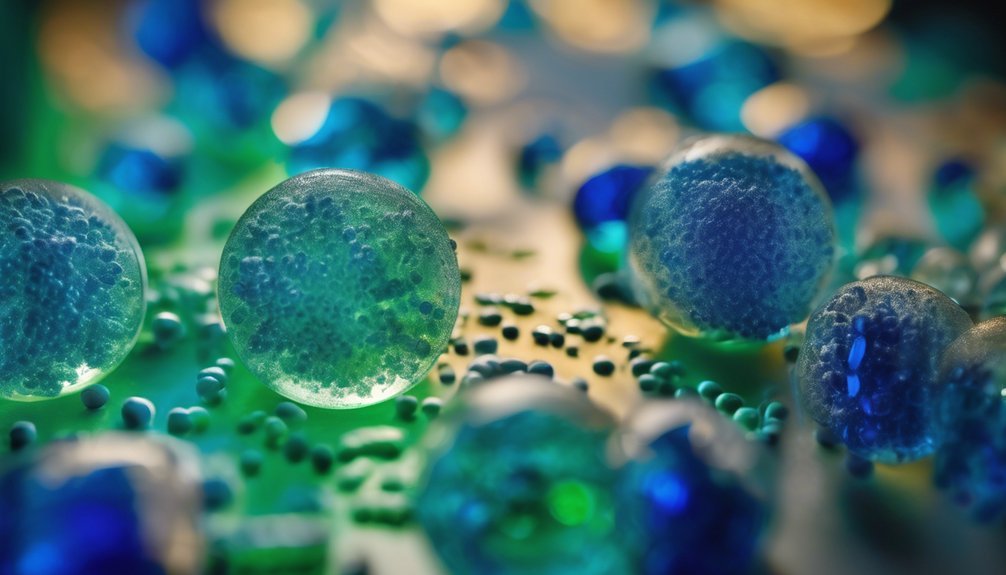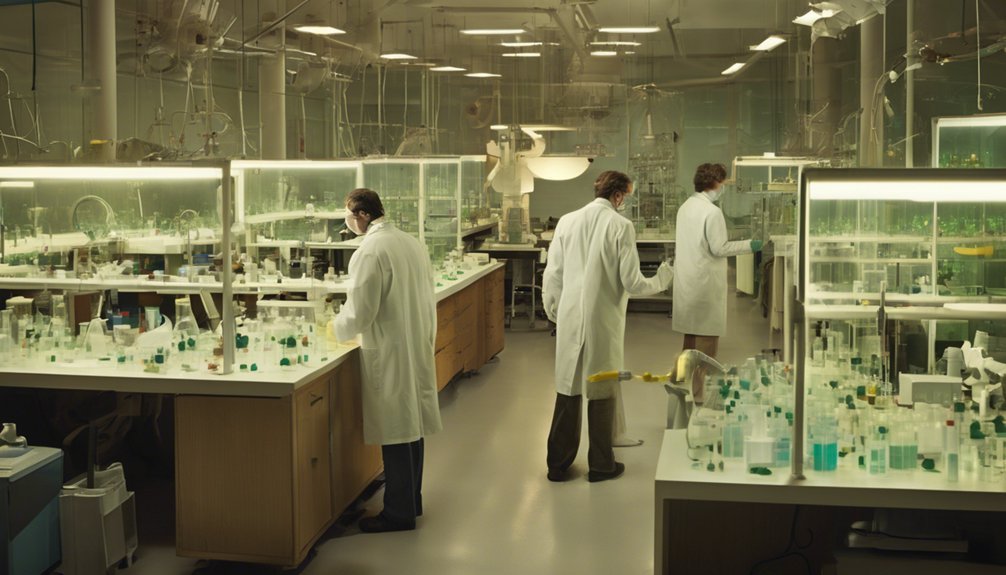When facing cancer therapy, you might not realize how significant a role nutrition can play in your journey. From assisting your body in coping with treatment side effects to potentially boosting the efficacy of therapies, what you eat matters more than you might think. By exploring the interplay between nutrition and cancer treatment, you can uncover strategies that could positively impact your well-being throughout your cancer therapy regimen.
Key Takeaways
- Proper nutrition supports treatment response and immune function.
- Personalized diet plans aid in managing side effects effectively.
- Nutrient-rich foods maintain strength and aid in healing.
- Antioxidants protect cells and support the body during therapy.
- Hydration and gut health play crucial roles in cancer treatment.
Nutritional Requirements During Treatment
Navigating the complexities of cancer treatment can be overwhelming, but understanding your nutritional requirements during this time is crucial for your overall well-being. Nutritional counseling plays a vital role in helping you maintain your strength and manage potential side effects of treatment. It's essential to work closely with a registered dietitian who can create a personalized nutrition plan tailored to your specific needs.
Dietary restrictions may vary depending on the type of cancer you're fighting and the treatment you're undergoing. Some treatments may cause changes in taste, appetite, and digestion, making it challenging to meet your nutritional needs. Your dietitian can guide you on foods to include or avoid to ensure you're getting the necessary nutrients to support your immune system and aid in your recovery.
Impact of Diet on Treatment Effectiveness
To enhance the effectiveness of your cancer treatment, understanding the impact of your diet is crucial. Dietary balance plays a significant role in how your body responds to treatment. Consuming a variety of nutrient-rich foods can help maintain your strength and support your immune system during therapy. Nutritional counseling is a valuable resource that can guide you in making informed decisions about what to eat to optimize the effectiveness of your treatment.
Maintaining a balanced diet that includes a mix of fruits, vegetables, whole grains, lean proteins, and healthy fats is essential. These foods provide the necessary nutrients your body needs to cope with the demands of cancer treatment.
Nutritional counseling can help you tailor your diet to meet your individual needs, ensuring you're getting the right balance of nutrients to support your overall health and well-being during treatment.
Managing Side Effects Through Nutrition

Managing side effects through nutrition is a vital aspect of your cancer treatment journey. Your digestive health plays a crucial role in how your body processes nutrients during therapy. To support optimal digestive health, focus on incorporating easily digestible foods such as cooked vegetables, lean proteins, and whole grains. These choices can help reduce digestive discomfort and support nutrient absorption, allowing your body to better utilize the essential vitamins and minerals needed for healing.
When experiencing side effects like nausea or changes in taste, small, frequent meals and staying hydrated can be beneficial. Opt for soothing foods like broths, herbal teas, and yogurt to help ease discomfort and maintain nutrient intake.
Additionally, working with a dietitian can provide personalized recommendations to manage specific side effects and ensure you're getting the necessary nutrients for your overall well-being.
Immune System Support With Food
Supporting your immune system through nutrition is a key component of your overall health, especially during cancer therapy. Your immune system plays a crucial role in fighting off illness and supporting your body's healing process. Incorporating immune-boosting foods into your diet can help strengthen your body's defenses and enhance your well-being. Here are some essential tips to support your immune system with food:
- Include superfoods: Superfoods like berries, leafy greens, and nuts are packed with antioxidants and nutrients that can boost your immune system.
- Prioritize whole foods: Opt for whole, unprocessed foods over processed options to provide your body with the essential nutrients it needs to function optimally.
- Stay hydrated: Drinking plenty of water and herbal teas can help keep your immune system functioning at its best.
Role of Antioxidants in Cancer Therapy

When navigating cancer therapy, understanding the role of antioxidants is crucial in optimizing your treatment plan. Antioxidants are essential compounds that help protect your cells from damage caused by free radicals, which are unstable molecules that can contribute to cancer development. Including antioxidant-rich foods in your diet such as berries, nuts, seeds, dark leafy greens, and colorful fruits like oranges and grapes can provide you with a natural source of these protective compounds.
In addition to dietary sources, antioxidant supplementation may be recommended by your healthcare provider to further support your body during cancer therapy. Supplements like vitamin C, vitamin E, selenium, and coenzyme Q10 are commonly used to enhance antioxidant levels in the body. However, it's important to consult with your healthcare team before starting any supplements to ensure they're safe and appropriate for your specific situation.
Importance of Hydration in Treatment
Navigating cancer therapy requires attention to various aspects that can impact your treatment outcomes. Adequate hydration plays a crucial role in supporting your body during cancer treatment. Here's why staying hydrated is essential:
- Maintaining Electrolyte Balance: Proper hydration helps in regulating the balance of electrolytes in your body, which are essential for various bodily functions.
- Supporting Fluid Intake: Ensuring you drink enough fluids can help prevent dehydration, which can lead to fatigue, nausea, and other treatment-related side effects.
- Enhancing Treatment Efficacy: Being well-hydrated can improve the effectiveness of certain cancer treatments by helping medications reach their intended targets more efficiently.
Remember to consult your healthcare team for personalized recommendations on fluid intake. By prioritizing hydration and maintaining electrolyte balance, you can support your body through cancer therapy and optimize your overall well-being.
Weight Management and Cancer

Optimizing your weight management is a key aspect to consider when undergoing cancer therapy. Maintaining a healthy weight can positively impact your treatment outcomes and overall well-being during this challenging time. To achieve this, focusing on appetite control and metabolic balance is crucial.
Cancer and its treatments can often affect your appetite, leading to weight loss or gain. It's essential to work closely with your healthcare team to find a balance that supports your nutritional needs while managing any side effects that may impact your weight. By paying attention to your appetite cues and making mindful food choices, you can support your body's healing process.
Additionally, maintaining a metabolic balance through a combination of nutritious meals and regular physical activity can help regulate your weight and energy levels. Small, frequent meals rich in essential nutrients can aid in managing weight fluctuations and providing your body with the fuel it needs to cope with treatment demands. Prioritizing weight management through appetite control and metabolic balance can contribute to a more effective cancer therapy journey.
Nutritional Strategies for Energy Levels
To enhance your energy levels during cancer therapy, implementing targeted nutritional strategies is essential. Proper nutrient timing and incorporating performance foods can make a significant difference in how you feel and function throughout your treatment. Here are some key strategies to help you optimize your energy levels:
- Nutrient Timing: Consuming the right nutrients at the right times can help fuel your body for optimal performance and recovery.
- Performance Foods: Including foods rich in complex carbohydrates, lean proteins, and healthy fats can provide sustained energy levels and support your overall well-being.
- Hydration: Staying well-hydrated is crucial for maintaining energy levels and supporting various bodily functions.
Gut Health and Cancer Treatment

Exploring the intricate relationship between gut health and cancer treatment is crucial for understanding how your digestive system plays a vital role in your overall well-being during therapy.
Your gut is home to a diverse community of microorganisms, known as the microbiome, which influences your immune system and overall health. Cancer treatments like chemotherapy and radiation can disrupt this delicate balance, leading to digestive issues such as diarrhea, nausea, and weakened immunity.
Maintaining microbiome diversity during cancer therapy is essential for supporting your body's ability to fight off infections and recover efficiently. Probiotic supplementation, which introduces beneficial bacteria into your gut, can help restore this balance and alleviate some of the gastrointestinal side effects of treatment.
Dietary Supplements in Therapy
Amidst the challenges of cancer therapy, the incorporation of dietary supplements can provide valuable support in enhancing your overall well-being and treatment outcomes. When considering dietary supplements in therapy, it's essential to understand the supplement effectiveness and follow proper dosage guidelines. Here are some key points to keep in mind:
- Supplement effectiveness: Choose supplements that have been researched and proven to benefit cancer patients. Look for options like vitamin D, omega-3 fatty acids, and probiotics that can support your immune system and overall health during treatment.
- Dosage guidelines: Consult with your healthcare provider or a registered dietitian to determine the appropriate dosage for the supplements you plan to incorporate. It's crucial to follow recommended dosages to ensure effectiveness and avoid any potential adverse effects.
- Personalized approach: Tailor your supplement intake to your specific needs and treatment plan. What works for one person may not be suitable for another, so seek professional guidance to create a personalized supplement regimen that complements your cancer therapy.
Mindful Eating Practices

Considering the role of dietary supplements in supporting your well-being during cancer therapy, it's valuable to also explore mindful eating practices. Mindful eating habits involve being fully present while eating, paying attention to the flavors, textures, and sensations of each bite. This practice can help you develop a healthier relationship with food and make more conscious choices about what you eat.
Emotional eating, common during stressful times like cancer therapy, can lead to overeating and unhealthy food choices. Mindful eating can help you distinguish between physical hunger and emotional cravings, allowing you to address the root of your emotions without turning to food for comfort.
Incorporating portion control into your meals and practicing mindful snacking can help you maintain a balanced diet while undergoing cancer therapy. By being mindful of your body's signals of fullness and hunger, you can avoid overeating and improve your overall nutritional intake. Developing these mindful eating practices can support your well-being and enhance the effectiveness of your cancer treatment.
Long-term Nutritional Strategies
When looking ahead to your long-term well-being during and after cancer therapy, implementing sustainable nutritional strategies becomes crucial. To ensure you maintain a balanced and nourishing diet, consider the following:
- Meal Planning: Engage in weekly meal planning to ensure you have nutritious options readily available. This can help you avoid reaching for unhealthy choices when time is limited or energy levels are low.
- Nutrient Timing: Pay attention to when you consume nutrients throughout the day. Aim to fuel your body with a good balance of proteins, carbohydrates, and fats at regular intervals to support your energy levels and overall health.
- Hydration: Remember to stay hydrated by drinking an adequate amount of water daily. Proper hydration is essential for various bodily functions and can aid in maintaining your overall well-being.
Frequently Asked Questions
Can Certain Foods Interfere With Chemotherapy Effectiveness?
Certain foods, especially dietary supplements, may indeed interfere with chemotherapy effectiveness. These supplements can sometimes interact with the drugs, affecting their potency.
Additionally, the gut microbiome can play a role in how your body processes medications.
It's crucial to consult with your healthcare team before making any significant changes to your diet during cancer treatment to ensure the best possible outcomes.
Are There Specific Foods to Avoid During Cancer Treatment?
During cancer treatment, it's important to be mindful of dietary restrictions. Some foods can interfere with nutrient absorption or cause unwanted side effects. To support your body, consider avoiding processed foods high in sugars and unhealthy fats. Opt for whole, nourishing foods like fruits, vegetables, lean proteins, and whole grains. Consult with your healthcare team for personalized recommendations tailored to your specific needs and treatment plan. Your well-being is a top priority during this time.
How Can Nutrition Help Reduce Treatment-Related Fatigue?
Like a well-tuned engine, meal planning can boost your energy levels during cancer treatment. By focusing on balanced meals rich in lean proteins, whole grains, and colorful fruits and veggies, you can help combat treatment-related fatigue. Incorporating small, frequent meals and staying hydrated also play key roles. Consulting with a nutritionist for personalized guidance can further optimize your energy levels and overall well-being throughout your cancer therapy journey.
What Role Does Sugar Play in Cancer Progression?
Sugar plays a crucial role in cancer progression by promoting tumor growth due to its impact on cell metabolism. Your dietary choices can directly affect how cancer cells thrive or struggle. By limiting sugar intake, you can potentially slow down cancer progression and improve treatment outcomes. Understanding the relationship between sugar consumption and cancer growth is essential in making informed decisions about your diet and overall health.
Is Fasting Beneficial During Cancer Therapy?
Fasting effects during cancer therapy can be beneficial for your body. While abstaining from food, your cells may become more resilient to treatment, potentially enhancing its effectiveness.
However, it's crucial to ensure proper nutritional support during fasting to maintain your strength and well-being. Consulting with a healthcare professional can guide you on the best approach to incorporate fasting into your cancer therapy regimen while receiving essential nutrients for your overall health.
Conclusion
In conclusion, remember the old saying: "You are what you eat." By prioritizing a balanced and nutrient-rich diet during cancer therapy, you are giving your body the best chance to heal and thrive. Your journey to better health starts with the food you choose to fuel your body. Stay informed, stay mindful, and remember that every bite counts towards your well-being. You've got this!





